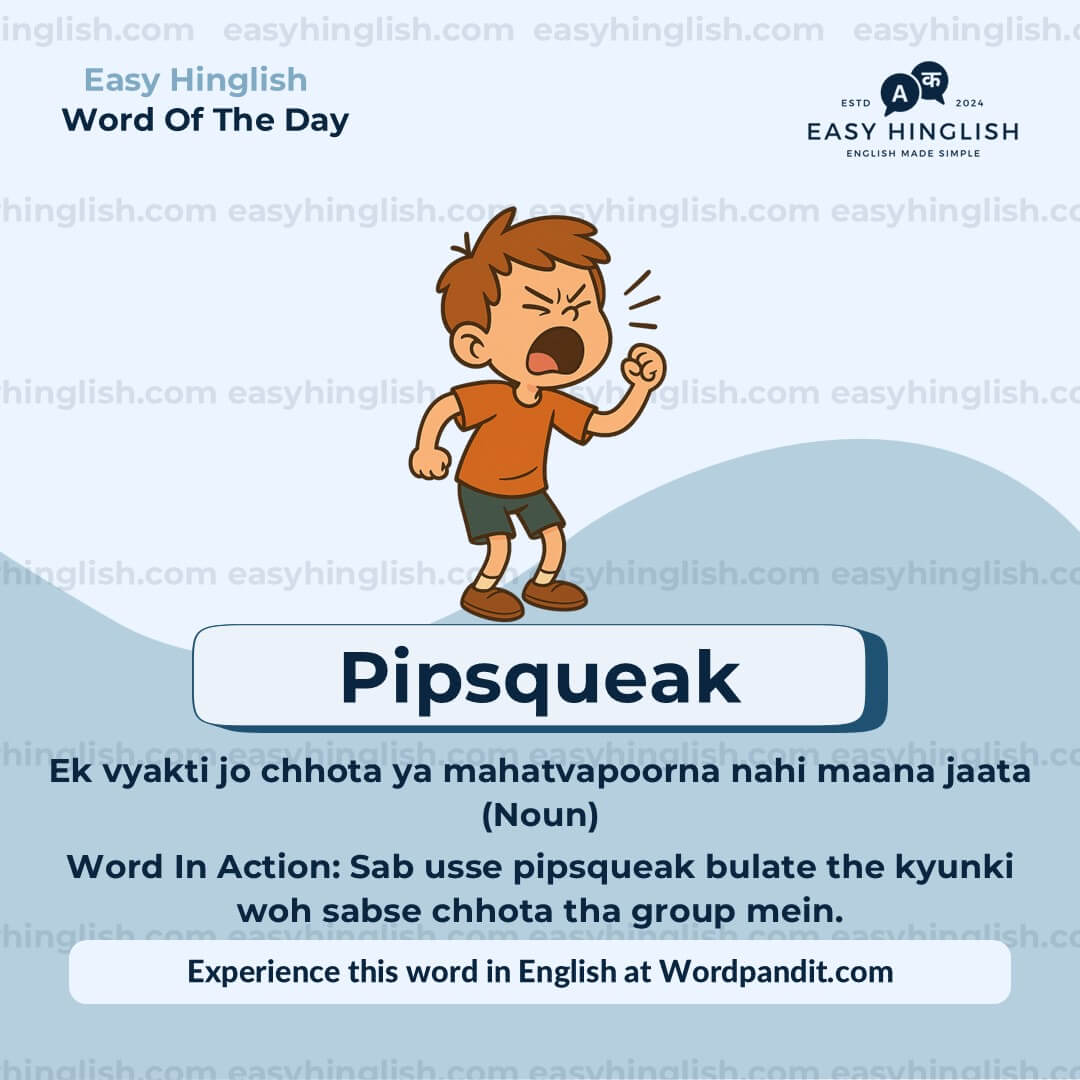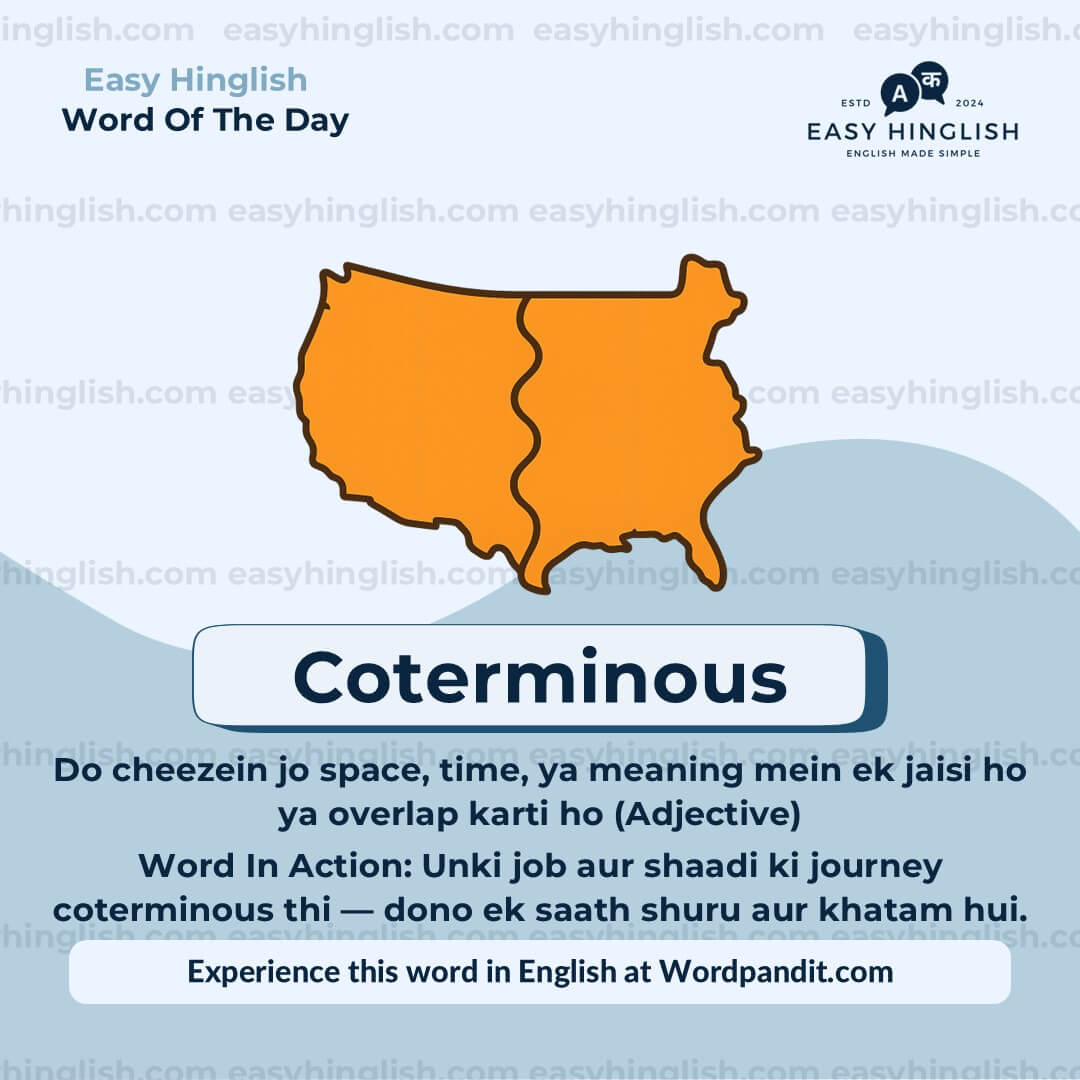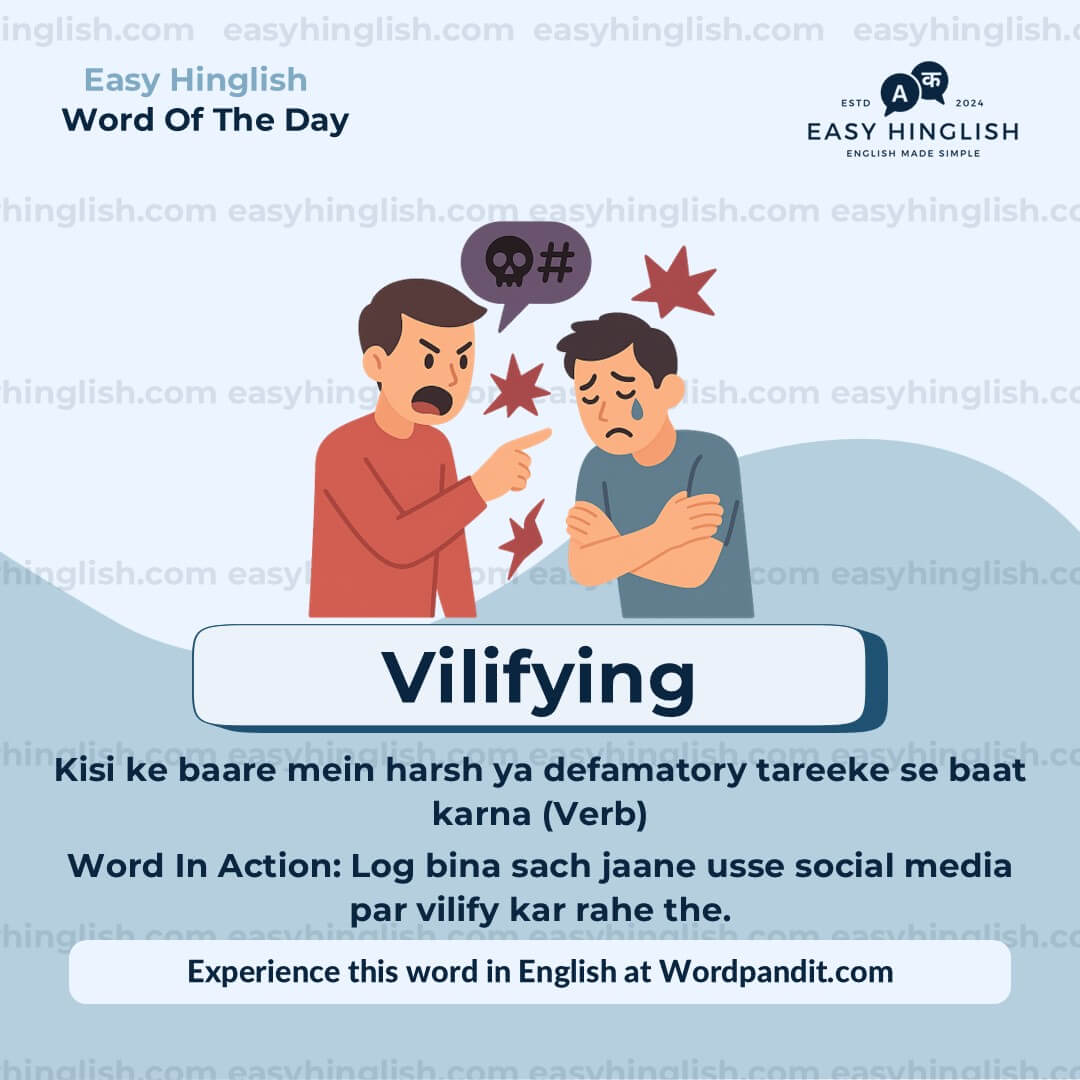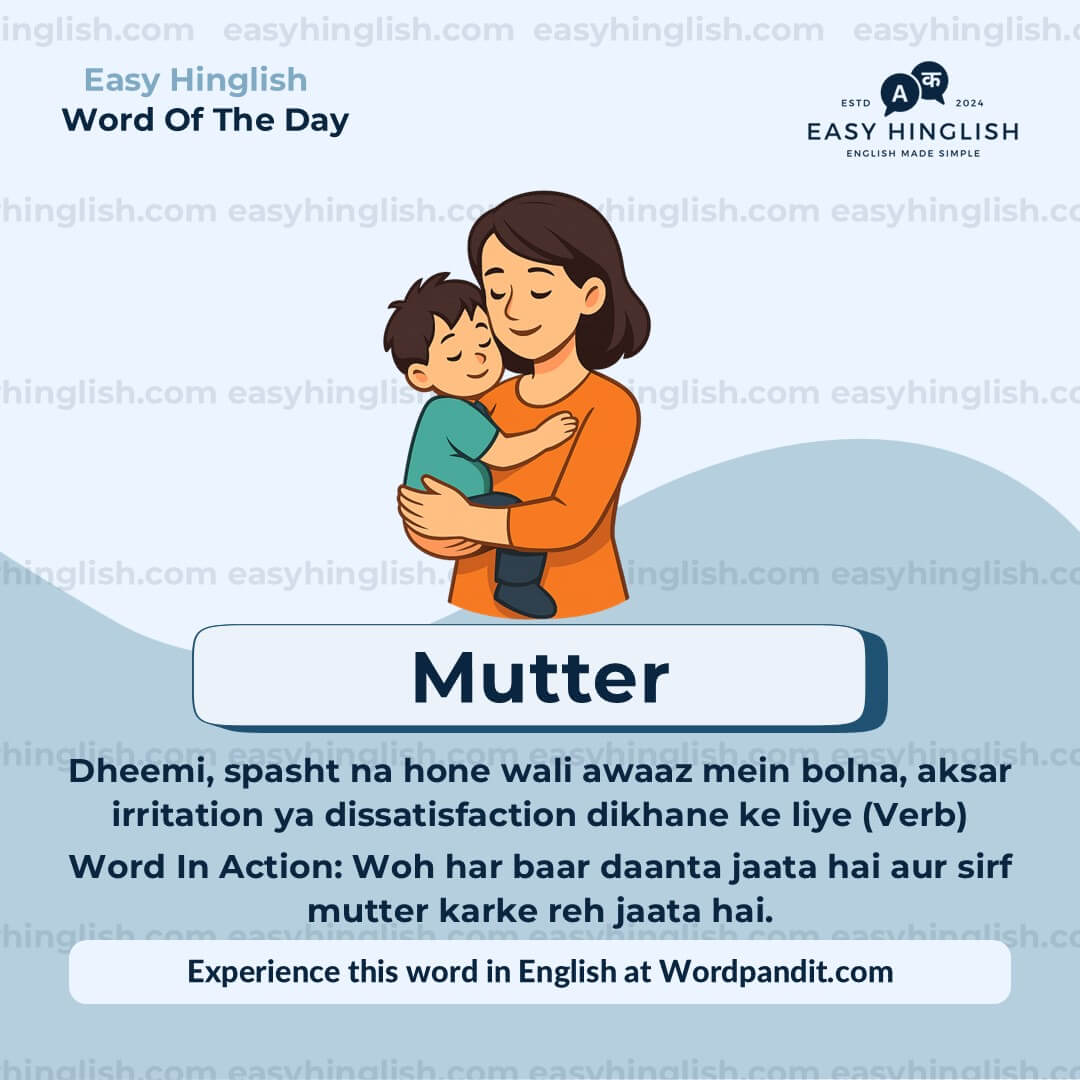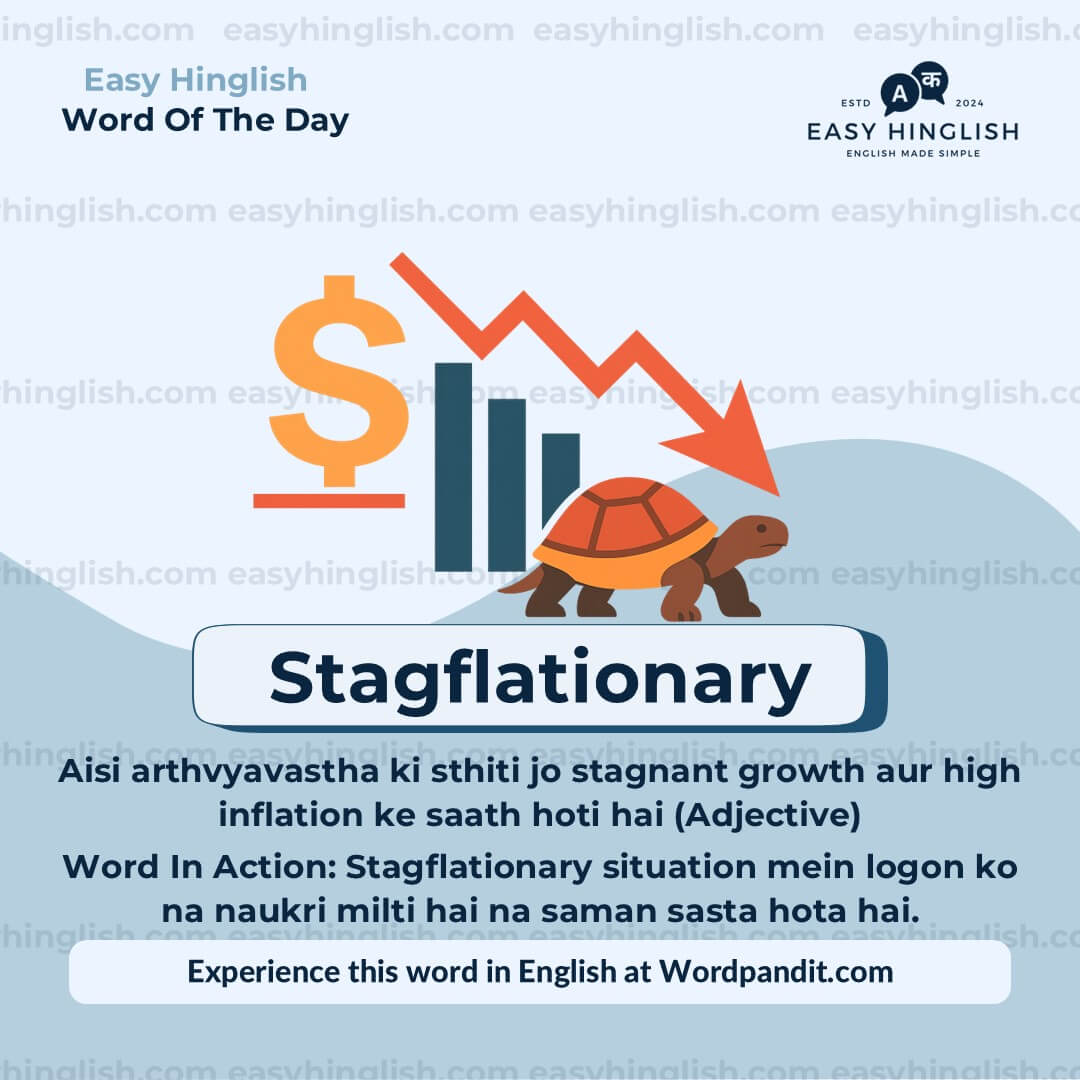Daily Vocabulary Indian Newspapers aur Publications se Seekho
Welcome to Wordpandit ka Indian Vocabulary Hub
Wordpandit par, hum samajhte hain ki ek achhi vocabulary develop karne ke liye local context samajhna bhi zaroori hai. Is section ka focus hai aapke vocabulary ko India ke leading newspapers aur publications se naye shabdon aur phrases ke zariye improve karna, taaki aap practical, relevant, aur uniquely Indian words seekh sakein.
Indian Sources Itne Important Kyun Hain?
Hum maante hain ki kisi bhi language ko sikhne ka sabse best tareeka hai uske local content me immerse hona. Isi wajah se hum carefully words curate karte hain top Indian newspapers aur publications se, jaise:
- The Hindu
- The Times of India
- The Economic Times
- Hindustan Times
- Live Mint
- The Indian Express
- Aur bhi bahut saare...
Hamesha Updated Raho, Hamesha Relevant Raho
Daily updates ke saath, aap Indian news sources se naye words seekhoge jo Indian society aur culture ke latest trends ko reflect karte hain. Hamara focus hai aise words provide karna jo aapke liye real-world me useful ho.
Wordpandit Aapke Learning Goals Ko Kaise Support Karta Hai?
Chahe aap exams ki preparation kar rahe ho, professional communication improve karna chahte ho, ya sirf naye words seekhna chahte ho, Wordpandit har step par aapki madad karega.
Practical Tareeke Se Seekho
Hamari interactive learning methodology me real-world examples, engaging activities, aur context-based usage shamil hain, taaki har naya shabd aapki active vocabulary ka hissa ban sake.
Aaj Hi Indian Vocabulary Seekhna Shuru Karo!
Wordpandit Kyun Choose Karein?
Practical Learning: Aise words seekho jo aapko real-world reading aur communication me sach me kaam aayenge, taaki aapki comprehension aur bolne ki skills improve ho.
Diverse Content: Current affairs se lekar scientific breakthroughs tak, hamare different sources aapko multiple domains ka vocabulary sikhate hain.
Effortless Integration: Wordpandit ko apni daily routine ka part banao. Sirf kuch minute har din dene se aapki vocabulary time ke saath kaafi improve ho sakti hai.
Aapka Vocabulary Mastery Tak Ka Safar
- Regularly hamare Daily Vocabulary section ko visit karo
- Naye words explore karo aur unka context me use samjho
- In words ko apni writing aur bolne ki practice me use karne ki koshish karo
- Jaise-jaise aapke words badhte hain, apni progress ko track karo
Aaj Se Apni Vocabulary Journey Shuru Karo!
Wordpandit ke saath vocabulary improve karna start karo. Roz thoda effort dalne se aap ek strong vocabulary develop kar sakte ho jo academic, professional, aur personal life me kaafi kaam aayegi.
Yaad rakho, ek naya shabd roz seekhna linguistic limitations ko door karne ka best tareeka hai! Wordpandit ko apni daily learning journey ka sathi banao aur vocabulary excellence ki taraf badho!
WORD-1: Pipsqueak
Sandarbh (Context):
"He acts like he's in charge, but everyone knows he's just a pipsqueak trying to look important." - The Atlantic
Vyakhya (Explanatory Paragraph):
“Pipsqueak” ek aisa shabd hai jo kisi chhoti ya kamzor vyakti ke liye playful ya thoda sarcastic tareeke se use hota hai—khaaskar jab woh apne se zyada important ya powerful dikhne ki koshish kare. Iska use aksar kisi ko uski aukaat ya position yaad dilane ke liye hota hai.
Arth (Meaning): Ek vyakti jo chhota ya mahatvapoorna nahi maana jaata (Noun)
Uccharan (Pronunciation): PIP-skweek
Kathinai Star (Difficulty Level): ⭐ Beginner
Utpatti (Etymology): 20th century ke aaspaas shuru hua, jisme “pip” (chhoti seed) aur “squeak” (patli si aawaaz) ka combination hai—jisse chhoti aur kamzor cheez ka impression milta hai.
Prashant Sir Ke Tathya (Prashant Sir's Notes):
Ye shabd sunne mein jaisa lagta hai, waisa hi lagta hai—chhota, squeaky aur kamzor. Iska istemal halka-phulka mazaak ya halka criticism mein karein.
Samanarthi & Vipritarthi (Synonyms & Antonyms):
Samanarthi (Synonyms): weakling, runt, shrimp, twerp, nobody
Vipritarthi (Antonyms): powerhouse, big shot, heavyweight, leader
Udaharan (Usage Examples):
- Us pipsqueak se mat daro—tumhara stand lena zaroori hai!
- Sirf 5 saal ka tha, par jab football match mein ghusne gaya, toh sab usse pipsqueak kehke hansne lage.
Sanskritik Sandarbh (Cultural Reference):
"You're nothing but a pipsqueak!" — purane cartoons aur movies mein yeh insult kaafi suna gaya hai, jab chhoti ya kamzor character ko neecha dikhaya jaata hai. - Cartoon Network Archives
Sochiye (Think About It):
Hum log kabhi-kabhi kisi ko “pipsqueak” kyu bol dete hain jabki unki asli capability size se badi hoti hai?
Chhoti Kriya (Quick Activity):
Sochiye kisi fictional character ke baare mein jo pehle “pipsqueak” lagta tha par baad mein powerful nikla. Uski journey 2 lines mein likhiye aur “pipsqueak” shabd ka use kijiye.
Yaad Karne Ka Tarika (Memory Tip):
Ek chhoti si chuhiya sochiye jo sher jaisi roar karne ki koshish kar rahi hai—vo hai ek “pipsqueak”!
Vastavik Jeevan Me Upyog (Real-World Application):
“Pipsqueak” ka use informal conversations, media ya political debates mein hota hai jab kisi overconfident chhoti ya kamzor vyakti ka mazaak udaya jaata hai.
WORD-2: Coterminous
Sandarbh (Context):
"For many, the rise of nationalism is coterminous with the decline of global cooperation." - Foreign Affairs
Vyakhya (Explanatory Paragraph):
“Coterminous” ka use tab hota hai jab do cheezein ya to same boundary share karti hain ya fir ek hi samay ya scope mein hoti hain. Yeh word geography, history, ya abstract concepts jaise ideologies mein kaafi use hota hai. Jaise agar do deshon ke borders same hain, to woh coterminous hain; ya agar do events ek saath ho rahe hain, to woh bhi coterminous kehlaate hain.
Arth (Meaning): Do cheezein jo space, time, ya meaning mein ek jaisi ho ya overlap karti ho (Adjective)
Uccharan (Pronunciation): koh-TUR-mi-nuhs
Kathinai Star (Difficulty Level): ⭐⭐⭐ Intermediate
Utpatti (Etymology): Latin se aaya hai—*con-* (“saath”) + *terminus* (“boundary ya limit”), matlab “boundary share karna.”
Prashant Sir Ke Tathya (Prashant Sir's Notes):
“Coterminous” ek formal word hai jo mostly political science, law, ya geography mein use hota hai. Sochiye do cheezein ek saath chal rahi hain ya unki boundaries mil rahi hain—bas wahi hai coterminous.
Samanarthi & Vipritarthi (Synonyms & Antonyms):
Samanarthi (Synonyms): coextensive, concurrent, coinciding, contiguous
Vipritarthi (Antonyms): separate, disjoint, divergent, unrelated
Udaharan (Usage Examples):
- School district ki boundaries city limits ke saath coterminous hain.
- Uski identity uske mother ke role ke saath coterminous ho gayi thi.
Sanskritik Sandarbh (Cultural Reference):
"The Enlightenment was coterminous with revolutions in science, philosophy, and politics." — Academic textbooks mein yeh phrase kaafi popular hai jab ek hi samay ke major changes ko describe kiya jaata hai.
Sochiye (Think About It):
Kya do ideas coterminous ho sakte hain agar wo alag-alag ya vipreet lagte hain? Yeh human perception ke baare mein kya batata hai?
Chhoti Kriya (Quick Activity):
Kisi ek decade ke do major world events ko sochiye. Kya woh coterminous hain? Ek sentence likhiye jisme dono ko connect karke “coterminous” ka use ho.
Yaad Karne Ka Tarika (Memory Tip):
“Co” matlab saath + “terminus” matlab boundary—yaani do cheezein jo same jagah ya samay pe end ho rahi hain = Coterminous!
Vastavik Jeevan Me Upyog (Real-World Application):
“Coterminous” legal documents, politics, aur academic writings mein kaafi use hota hai—jaise overlapping laws, samay boundaries, ya ek hi samay hone wale social events ko describe karne ke liye.
WORD-3: Vilifying
Sandarbh (Context):
"The political ad was clearly aimed at vilifying the opposition rather than discussing real issues." - NPR
Vyakhya (Explanatory Paragraph):
“Vilifying” ka matlab hota hai kisi ke baare mein jaan bujhkar buri, abusive ya insulting baatein kehna ya likhna—aksar bina kisi valid reason ke. Jab kisi ko public image mein badnaam karna ho, toh log vilify karte hain. Yeh word aksar politics, media ya personal conflicts mein use hota hai jab kisi ka naam kharaab karna ho.
Arth (Meaning): Kisi ke baare mein harsh ya defamatory tareeke se baat karna (Verb)
Uccharan (Pronunciation): VIL-uh-fy-ing
Kathinai Star (Difficulty Level): ⭐⭐ Upper Beginner
Utpatti (Etymology): Latin shabd *vilis* (“cheap ya base”) + *-fy* (“banana”), yaani kisi ko worthless ya bad bana dena.
Prashant Sir Ke Tathya (Prashant Sir's Notes):
“Vilifying” ek aggressive aur intentional word hai—yeh sirf criticism nahi hota, balki kisi ki image ko jaan bujhkar kharaab karne ki koshish hoti hai. Jab manipulation ya propaganda ki baat ho, tab yeh word sahi fit baithta hai.
Samanarthi & Vipritarthi (Synonyms & Antonyms):
Samanarthi (Synonyms): slandering, defaming, maligning, denigrating, disparaging
Vipritarthi (Antonyms): praising, commending, lauding, celebrating, honoring
Udaharan (Usage Examples):
- Scandal ke baad tabloids ne usse vilify kar diya, jabki koi charges prove nahi hue the.
- Speaker ne issue discuss karne ke bajaye apne opponent ko vilify karne mein zyada dhyan diya.
Sanskritik Sandarbh (Cultural Reference):
“History mein kai baar whistleblowers ko pehle vilify kiya gaya, aur baad mein unhe hero banaya gaya.” — Jaise movies *The Post* ya *Snowden* mein dikhaya gaya hai.
Sochiye (Think About It):
Society aksar un logon ko vilify kyu karti hai jo sach bolte hain ya norms ko challenge karte hain?
Chhoti Kriya (Quick Activity):
Ek short sentence likhiye jahan kisi ko unfairly vilify kiya gaya ho. Phir us sentence ko firse likhiye jahan ek balanced view dikhaya gaya ho.
Yaad Karne Ka Tarika (Memory Tip):
“Vilify” sunte hi yaad aata hai “vile-ify”—yaani kisi ko vile ya evil banana. Bas wahi iska matlab hai!
Vastavik Jeevan Me Upyog (Real-World Application):
“Vilifying” ka use aksar political debates, media aur social media par hota hai jab kisi public figure ya group ko harshly criticize karke public opinion ko influence karna ho.
WORD-4: Mutter
Sandarbh (Context):
"He began to mutter complaints under his breath when no one seemed to listen to his ideas." - The Guardian
Vyakhya (Explanatory Paragraph):
“Mutter” ka matlab hota hai dheemi, mushkil se sunayi dene wali awaaz mein bolna—aksar tab jab koi naraz ho, sharma raha ho, ya khulke bolne ki himmat na ho. Jab kisi ko kuch kehna hota hai bina zyada dikkat machaye ya bina kisi ka dhyan khinchaye, toh woh mutter karta hai. Yeh word grumbling, chhid-chhid, ya halki si rebellion dikhane ke liye bhi use hota hai.
Arth (Meaning): Dheemi, spasht na hone wali awaaz mein bolna, aksar irritation ya dissatisfaction dikhane ke liye (Verb)
Uccharan (Pronunciation): MUH-ter
Kathinai Star (Difficulty Level): ⭐ Beginner
Utpatti (Etymology): Middle English *moteren* se aaya hai, jo ek onomatopoeic word hai—matlab jaise sound karta hai, waisa hi shabd hai.
Prashant Sir Ke Tathya (Prashant Sir's Notes):
“Mutter” ek zabardast example hai onomatopoeia ka—jo shabd jaisa sunai deta hai, waisa hi matlab nikalta hai. Fiction aur conversations mein mood dikhane ke liye yeh word kaafi kaam aata hai bina directly bataye.
Samanarthi & Vipritarthi (Synonyms & Antonyms):
Samanarthi (Synonyms): murmur, mumble, grumble, whisper, grouse
Vipritarthi (Antonyms): shout, declare, announce, proclaim
Udaharan (Usage Examples):
- Usne kuch ajeeb sa mutter kiya aur wahaan se nikal gaya.
- Jab test ka announcement hua, students ne mutter karna shuru kar diya.
Sanskritik Sandarbh (Cultural Reference):
“Muttering spells” fantasy fiction mein ek common trope hai—jaise *Harry Potter* mein, jahan wizards dhyaan laga ke dheemi awaaz mein jaadu bolte hain. - Fantasy Literature Review
Sochiye (Think About It):
Log upset ya nervous hone par clear bolne ke bajaye mutter kyu karte hain? Kya yeh unka emotion chhupane ka tareeka hota hai?
Chhoti Kriya (Quick Activity):
Do characters ka ek short dialogue likhiye jisme ek mutter kar raha ho aur doosra samajhne ki koshish kar raha ho. “Mutter” ka use kam se kam do baar kijiye.
Yaad Karne Ka Tarika (Memory Tip):
“Mutter” ka sound hi uske matlab jaisa hai—“muh-muh-muh” jaise koi apne aap se ya chhupke bol raha ho. Bas wahi yaad rakho!
Vastavik Jeevan Me Upyog (Real-World Application):
“Mutter” ko hum har roz ki conversations aur kahaniyon mein use karte hain jab kisi ka gussa, irritation ya disagreement subtle tareeke se dikhana ho.
WORD-5: Stagflationary
Sandarbh (Context):
"Compared to its earlier projections, the recent prints have compelled scaling down of growth projections to 6.6% for FY25 (down 60 basis points) and inflation projection higher at 4.8% (up 30 basis points), characterising a stagflationary impulse." - The Wire
Vyakhya (Explanatory Paragraph):
“Stagflationary” ek aisi economic situation ko describe karta hai jahan economy grow nahi kar rahi hoti (ya bahut dheere grow kar rahi hoti hai), par prices high ho jaate hain (inflation badh jaata hai). Ye combination uncommon hota hai aur solve karna mushkil bhi hota hai, kyunki inflation kam karne ke steps growth ko aur slow kar sakte hain. Economists isse ek dangerous signal maante hain jo imbalance dikhata hai economy mein.
Arth (Meaning): Aisi arthvyavastha ki sthiti jo stagnant growth aur high inflation ke saath hoti hai (Adjective)
Uccharan (Pronunciation): stag-FLAY-shuh-nair-ee
Kathinai Star (Difficulty Level): ⭐⭐⭐⭐ Advanced
Utpatti (Etymology): “Stagnation” + “Inflation” ka blend; pehli baar 1960s UK mein coin hua tha aur 1970s oil crisis ke time widely use hone laga.
Prashant Sir Ke Tathya (Prashant Sir's Notes):
Yeh ek technical economics term hai, par aaj kal news aur finance articles mein kaafi dikhta hai. Dhyan rakhein—yeh ek tricky situation hoti hai jisme normal solutions kaam nahi karte. Breakdown karein: “stag” (slow growth) + “flation” (inflation).
Samanarthi & Vipritarthi (Synonyms & Antonyms):
Samanarthi (Synonyms): economically stagnant, inflation-ridden, recession-inflated
Vipritarthi (Antonyms): expansionary, deflationary, booming, thriving
Udaharan (Usage Examples):
- Central bank stagflationary climate mein interest rate badhane ko le kar cautious hai.
- Experts keh rahe hain ki current geopolitical tensions emerging markets mein stagflationary trends la sakti hain.
Sanskritik Sandarbh (Cultural Reference):
1970s ke oil crisis ke dauraan “stagflation” ek common term ban gaya tha, jab western economies ruk gayi thi par prices tezi se badh rahe the. – Economic History Channel
Sochiye (Think About It):
Agar kisi economy mein inflation bhi high hai aur growth bhi slow ho gayi hai, toh government kaise balance kare policies ko? Kya aisa koi solution hai jisme dono problems solve ho sakein?
Chhoti Kriya (Quick Activity):
Stagflationary period ke teen possible causes likhiye. Phir ek sentence likhiye jisme kisi imaginary country ka economic situation describe ho using “stagflationary”.
Yaad Karne Ka Tarika (Memory Tip):
Sochiye: “stag” matlab stagnant (ruk gaya) + “flation” matlab inflation (mehengaai). Jab growth ruk jaaye par prices bhaag rahe ho—tab hota hai stagflationary crisis!
Vastavik Jeevan Me Upyog (Real-World Application):
“Stagflationary” shabd economic news, forecasts, aur policy discussions mein use hota hai jab economy aise zone mein hoti hai jahan normal economic tools fail ho jaate hain. Finance, public policy, ya business strategy mein interested logon ke liye yeh word jaana bahut zaroori hai.



